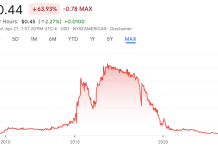IDW Media Holdings, the parent company of IDWP (publishing) and IDWE (entertainment), has filed an S-1 investment prospectus seeking to raise $8 million to get uplisted to the New York Stock Exchange.
At least, that’s a layman’s interpretation of their latest SEC filing, and this Renaissance Capitol report.
Although an S-1 filing is the precursor to an IPO (initial public offering), the main goal of this appears to be getting IDW listed on the NYSE, a more high profile stock exchange — IDW is currently listed as an OTC (over the counter) stock — while also raising $8 million, which is always helpful.
You can read the prospectus in the first link, and if you are savvy about financial matters, you can probably make your own interpretation. What follows is some of my own thoughts — I’m certainly no expert on stocks, so it is possible I have misinterpreted some of the filings. However, I do know a lot of IDW’s background.
IDW’s principal stockholder is former CEO Howard Jonas, who serves as Chairman of the Board and is also the primary decision maker for the company’s financial actions. IDW Media Holding’s CEO is currently Ezra Rosensaft, their former CFO. The company recently announced a loss of $500,000 for its publishing division in the most recent quarter, although sales were up considerably year over year. (With 2020 including early pandemic crashes and the Diamond shutdown, this is not a shock.)
In the race to develop media to streaming and other lucrative media platforms, IDW has had some successes, including Wynonna Earp, V Wars, October Faction and, of course, Locke & Key. It is notable (in my opinion) that IDW is probably better known for their licensed publishing than originals — there’s nothing wrong with that. Licensed material can be profitable and creative. Purchasing Top Shelf in 2015 definitely added a lot more creator-owned and driven material, however, including the huge, important successes of The March Trilogy and They Called Us Enemy.
But still, in order to exploit IP, you need lots of IP — something that IDW has plenty of, even if it hasn’t been the most prominent part of its publishing program. According to the prospectus “Titles such as Canto, Ghost Tree, Road of Bones and Mountainhead are in active development.” Given all the recent hirings and promotions at the company, more IP is on the way.
So to the prospectus: in all honesty, my eyes literally glazed over as I read the 60+ page filing…but it contains all you could want to know about IDW Media Holdings financials. For now, I will quote a few passages as perhaps the perfect statement of what a comics publisher does in 2021: try to leverage IP.
First, a section called “Our Strategy”
We seek to improve our financial performance primarily by focusing on development of entertainment that can generate value across our intellectual property (“IP”) holdings and to increase coordination between IDWP and IDWE to enhance our development pipeline. IDWP and IDWE intend to jointly and synergistically develop and produce books and entertainment to allow us to capitalize on the global demand for original content from streaming services as well as traditional broadcast and other networks and other content services. To date, we have sold projects to Hulu, Syfy, BBC America, Netflix and Endeavor Content, while others are in active discussion. We believe that our potential projects would be attractive to a broad range of potential distribution channels and participants.IDW’s IP, where we own “all rights”, affords the Company significant production-based fees supplemented by merchandising, games, video and other fandom-driven revenue opportunities.As we have a diverse slate of content, we plan to develop new editorial directives to better suit the ever-changing needs of the publishing world. We have spent considerable time and financial resources in identifying and cultivating new audiences, additional markets, and interesting new channels of distribution. We plan to expand and implement our mission of creating, marketing, and releasing captivating new comic books and graphic novels to the world.We continue to seek prospective upside from potential renewals of IDWE’s current line-up, from previously announced deals with Cineflix and SyFy for distribution of Wynonna Earp and renewal of seasons 2 and 3 of Locke & Key to new deals that IDWE is developing from IDWP’s growing library of content, where we have media and ancillary rights. We believe that our focus on monetization through merchandising, games, video on demand, and other fandom-driven channels coupled with the demand from streaming networks for fresh, innovative shows provides us with a tremendous market opportunity. We believe that our IP portfolio, strong relationships with renowned creators and holistic approach to development strategically positions us for both near and long-term growth.
We have a history of continued operating losses at IDWE and IDWP and cannot be certain of our future profitability.
We had accumulated a net deficit through October 31, 2020 of approximately $92.0 million. Prior to the CTM Sale, which closed on February 15, 2021, and until the start of the COVID-19 pandemic in April 2020, we often used cash flows from CTM to partially provide funding for corporate overhead and for our IDWP and IDWE operations. In Fiscal 2020 IDW Media Holdings and IDWP generated positive cash flow of $8.0 million and $795,000, respectively, while IDWE and CTM generated negative cash flow of $5.8 million and $1.0 million, respectively. In Fiscal 2019, IDW Media Holdings and CTM generated positive cash flow of $7.2 million and $2.9 million, respectively, while IDWP and IDWE generated negative cash flow of $1.9 million and $11.6 million, respectively.”
We expect to incur losses in the foreseeable future as we continue to seek financing for, and invest in, our IDWE and IDWP businesses and operations. While our Chairman of the Board has previously provided us with financing on favorable terms and conditions, there is no guarantee that we will be able to secure such financing from our Chairman of the Board in the future on favorable terms or at all. The time required for us to become profitable is uncertain, and there can be no assurance that we will obtain the financing required or achieve profitability on a sustained basis, if at all. We expect that our results of operations may also fluctuate significantly in the future as a result of a variety of factors, including, without limitation: the impact of the COVID-19 pandemic, the ability to finance television shows without great financial risks; our ability to attract, retain and motivate qualified personnel; specific economic conditions in the entertainment and publishing markets; and general economic conditions.
Reading between the lines a little here, the Chairman is Howard Jonas, and he’s been reinvesting in the company for a while, but an IPO seems like a better way to get a return on that investment than just publishing comics.
There’s a longer section on strategy:
Our Strategy
We seek to improve our financial performance by primarily focusing on development of entertainment that can generate value from our intellectual property and to increase coordination between IDWP and IDWE to improve our development pipeline. IDWP and IDWE will seek to jointly and synergistically develop and produce books and entertainment so as to allow us to capitalize on the global demand for original content from streaming services including Netflix, Disney+, Hulu, AppleTV+, Amazon Prime Video, HBO Max, Peacock (Comcast), and CBS All Access, as well as traditional networks such as NBC, ABC, CBS, Fox, USA, Comedy Central, Discovery Channel, Syfy, BBC America, Disney Channel, Nickelodeon, Showtime, Starz and dozens of other content services. To date, we have sold projects to Hulu, Syfy, BBC America, Netflix and Endeavor Content, while others are in active discussion.
We seek to own “all rights” to intellectual property (“IP”) of our content in order to, afford us significant production-based fees supplemented by merchandising, games, video and other fandom-driven revenue opportunities.
We believe that our key strategic points of differentiation include:
Given recent developments surrounding COVID-19, IDWP has revised its ongoing release schedule to better align with the needs and capacity of the changing retail marketplace. IDWP continues to serve both the direct and non-direct markets through its distribution partners and has added an increased focus on direct to consumer, digital initiatives, and development of merchandise. Content generation remains a key priority for IDWP as we continue to launch new creator-owned titles and expand partnerships with established brands to bring fan-favorite properties to the comics, graphic novel, and games markets. During the market slowdown, IDWP was able to quickly reduce ongoing content production to better suit the needs of the organization at the time, picking back up as the market showed signs of recovery.
In an effort to manage the risks associated with COVID-19, IDWE is diversifying its development slate to focus on both kids and adult animation projects which minimize the effects of COVID-19 through remote work-from-home initiatives. IDWE can shift into work-from-home protocols seamlessly thanks to our centralized filing and workflow systems. Though television will remain the core business, we are also expanding into podcasts, and other digital content as a way to increase the creation of IP.
Competition
IDWP competes most directly with both public and privately held companies that publish or license for publishing comic books and graphic novels, and further develop their franchises through digital media including shows and feature films.
Public company competitors for IDWP include Disney (Marvel) and ATT/Time Warner (DC), as well as smaller capitalized companies such as Wildbrain. Privately held competitors include Skybound Entertainment, Oni Press, Legendary Entertainment, Dark Horse and Image Comics.IDWE competes with all forms of entertainment. A significant number of companies produce and/or distribute television shows and films, and provide pay television and SVOD programming services. IDWE also competes to obtain creative talents and story properties that are essential to the success of our IDWE business.
The success of our operations is heavily dependent upon public taste and preferences. In addition, operating results fluctuate due to the timing and performance of releases in the television and book markets. Release dates are determined by several factors, including competition and the timing of vacation and holiday periods.=
Intellectual Property
There are two primary sources of the content that IDWP develops, publishes, and exploits across a range of distribution channels:
IDWP enters into publishing agreements with owners of both Creator Content and Licensed Content pursuant to which IDWP licenses the right to exploit such content (“Publishing Agreements”).
IDWP’s Publishing Agreements grant to IDWP exclusive, long term, worldwide rights to publish and sell the licensed content in all languages via traditional channels such as print and digital comics, graphic novels, and trade collections, and niche channels such as board games, coloring books, audio on demand, and high-end limited edition publications (“Publishing Rights”).
A smaller percentage of Publishing Agreements cover a more limited range of licensed rights in order to accommodate pre-existing products and markets already established by licensors such as foreign publishers seeking to have IDWP publish an English only version, licensed content owners seeking expansion into niche markets that can be more successfully exploited by IDWP, and establish authors who have already enjoyed publishing success prior to partnering with IDWP.
Many of IDWP’s Creator Content Publishing Agreements also grant to IDWP exclusive film, television, merchandising, and other ancillary worldwide rights in all formats, languages, and current and future media and delivery technologies (“Ancillary Rights”) that can then be exploited through IDWE or otherwise.
IDWP exploits the Publishing Rights via sales to comic book specialty stores, traditional retail outlets, and direct to consumers, and via sublicenses to digital distribution platforms and foreign territory sub-publishers.
IDWP exploits the Ancillary Rights primarily via its relationship with IDWE, but also through other third-party buyers.
IDWP owns or co-owns the copyright to certain published products that were developed pursuant to Publishing Agreements with first time authors, but most copyrights filed by IDWP are registered in the name of the licensor.
IDWP has registered and owns domain names that it uses to digitally promote and sell its products. It also has trademarked its name and logo, as well as the name and logo of its Top Shelf Productions imprint, and Micro Fun Packs product.
IDWP has developed game mechanics for certain of its game products that it treats as proprietary intellectual property in its Publishing Agreements.
IDW has certainly been hiring and promoting many people of late and ramping up to create more and more captivating entertainment, so they are moving forward on many fronts. As for this filing, the preliminary version of this prospectus was first filed back in October, and attracted little public attention, so whether this actually makes any difference in IDW’s operations remains to be seen.








